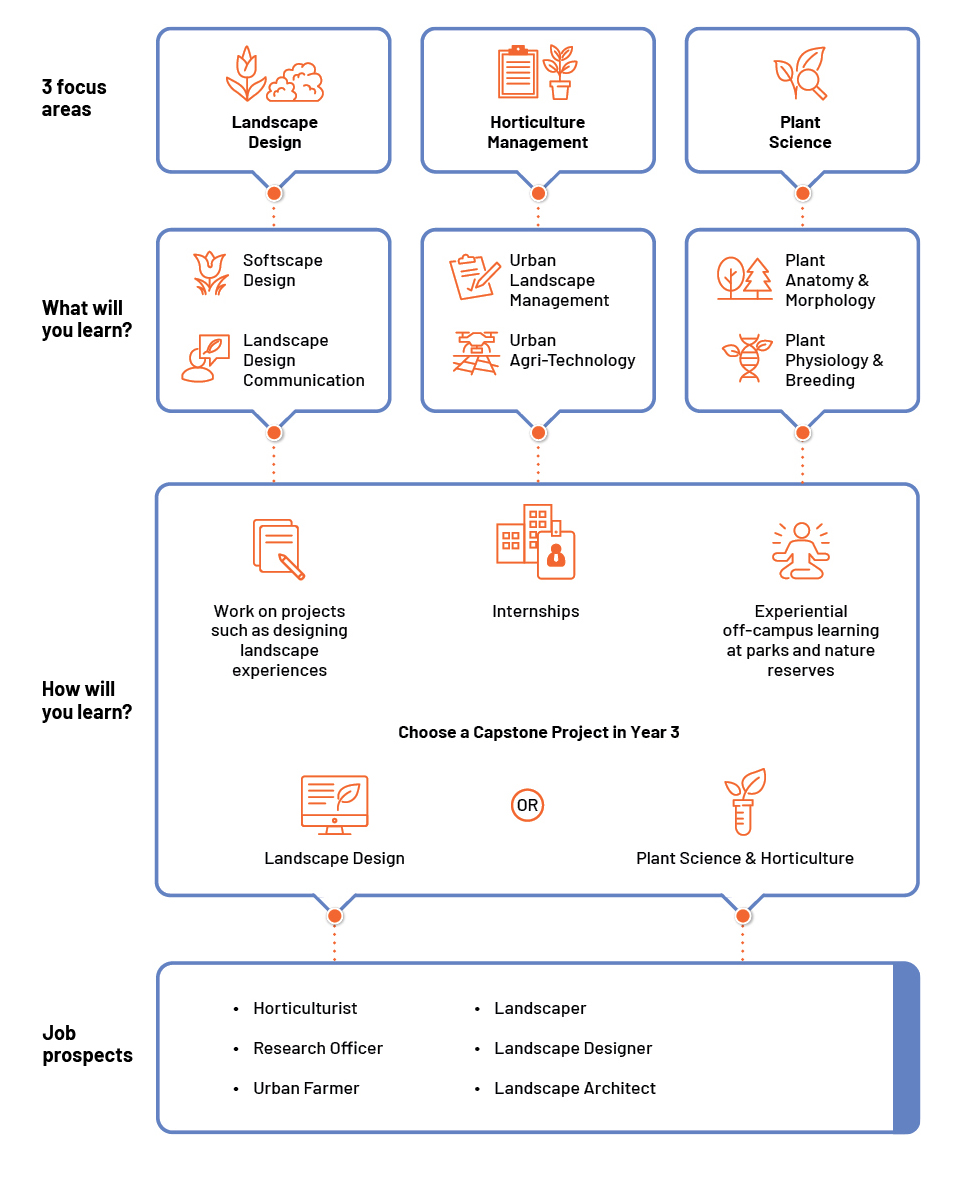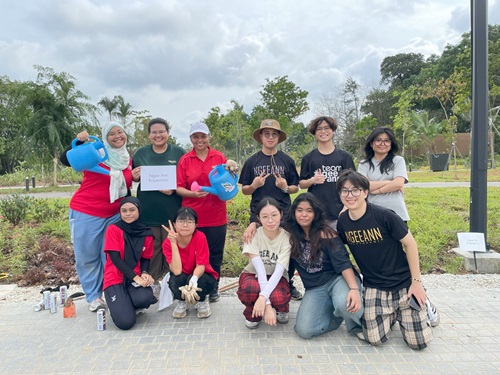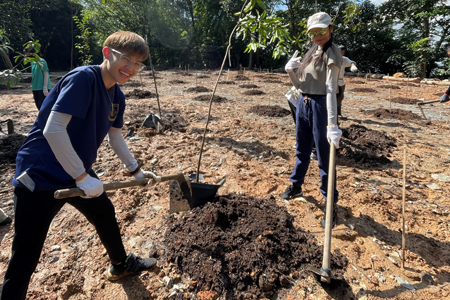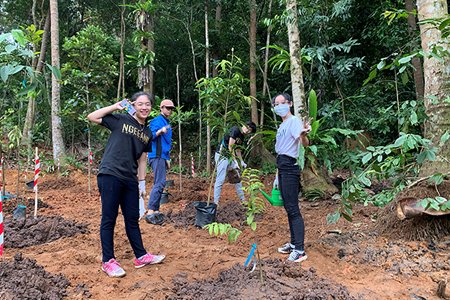Why LDH?
- One-of-a-kind diploma that combines training in landscape design, plant science and horticulture to prepare you for exciting roles in transforming Singapore’s cityscape
- Immersive learning at outdoor settings such as Singapore Botanic Gardens, Clementi Woods Park and nature reserves
- Learn the latest industry practices and technologies through a curriculum jointly developed, delivered, and assessed by industry, including the National Parks Board
- Build a strong multidisciplinary foundation to widen career options in sustainability-related fields such as horticulture, environmental science, landscape architecture and urban agriculture
About LDH
Want to be the creative drive behind Singapore’s garden city or help build a sustainable and green future? If you love nature and have a flair for design, the Diploma in Landscape Design & Horticulture (LDH) will put you on the right track to develop and enrich Singapore’s green spaces.
Combining landscape design, plant science and horticulture management, LDH is the only diploma-level course of its kind in Singapore. Thanks to our strong partnership with the National Parks Board, you can look forward to practical training at the Greenhub in Clementi Woods Park, Singapore Botanic Gardens, and other national parks and gardens.
You will develop skills in landscape design, urban ecology, conservation, and plant taxonomy. As you progress, you will study plant physiology, breeding, arboriculture, urban horticulture technology, and softscape design.
At our smart greenhouse facility, you will learn about urban agriculture and optimising crop growth using real-time data from smart sensors. Enjoy experiential learning outside of the classroom? You’ll get to be involved in tree planting or the removal of invasive plant species at Pulau Ubin and nature reserves around Singapore.
LDH will hone your project management skills at the various parks and project sites in Singapore, where you can help to design guided tours, therapeutic gardens, and biophilic play areas. You may also create prototypes of hydroponics and aquaponics systems, and investigate growth parameters for edible crops!
Our curriculum, jointly developed with industry partners, lets you tap into the expertise of companies that specialise in diverse areas ranging from smart landscaping technology, sustainable water management, and biodiversity impact assessments.
Graduates aiming to become certified arborists will receive exemptions for selected exam pre-requisites in the International Society of Arboriculture Certified Arborist Preparatory Programme.
In your final year, you can choose to work on a capstone project in Plant Science & Horticulture or Landscape Design, in collaboration with industry partners.
You can even deepen your learning by interning at a company specialising in the same domain area. With our renowned partner organisations such as Gardens by the Bay, Sentosa Golf Club, Singapore Botanic Gardens, Sungei Buloh Wetland Reserve, Pulau Ubin, Changi Airport, and Mandai Wildlife Reserve, you can look forward to an internship that will sharpen your skill sets!
Overview of Your LDH Journey

Highlights
Dragon in Bloom

Putting their creativity and skills to good use, LDH students Jayden Chia (first from bottom right) and Lai Shu Zhen (third from bottom right) used plants to create a dragon-like display at the new Floral Garden at the revamped Japanese Garden as part of an invitation from the National Parks Board.
Greening Singapore


As an LDH student, you can look forward to a variety of outdoor activities and learning opportunities! For example, you will get the chance to apply the skills that you’ve learnt in the classroom for a good cause by planting trees. Besides contributing to Singapore’s green efforts, you will play a part in building a liveable and sustainable city.
Industry Partners

Further Studies
You can apply for courses in fields such as architecture, landscape architecture, business, science and social studies at local universities. You may pursue a related degree course (such as architecture, landscape architecture, business, horticulture, plant science, botany and arboriculture) at overseas universities with module exemptions. These include:
Australia
- Australian National University
- Monash University
- The University of Adelaide
- The University of Melbourne
- The University of Queensland
- The University of Sydney
- The University of Western Australia
- University of New South Wales
New Zealand
- Lincoln University
United Kingdom
- The University of Manchester
United States
- University of Georgia
You can enrol in many relevant certification courses that are offered by the Centre for Urban Greenery and Ecology to further develop your expertise in the landscape industry. You can also stay current with industry practices by attending relevant programmes organised by the National Parks Board and the Singapore Institute of Landscape Architects.
Careers
Put your green thumbs to work at the two integrated resorts, three waterfront gardens at Marina Bay, country clubs, hotels and property developments across Singapore. The LDH course will open doors to exciting careers such as:
- Arboriculture Supervisor
- Horticulturist
- Horticulture Product Specialist
- Park Officer
- Lab Technologist
- Landscaper
- Landscape Designer
- Landscape Project Coordinator
- Landscape Supervisor
- Nursery Supervisor
- Research Officer
- Turfgrass Specialist
- Urban Farmer
Entry Requirements
AGGREGATE TYPE ELR2B2-D
To be eligible for consideration, candidates must have the following GCE ‘O’ Level examination (or equivalent) results.
| Subject | 'O' Level Grade |
|---|---|
| English Language | 1-7 |
| Additional Mathematics/Mathematics | 1-7 |
| Any one of the 2nd group of Relevant Subjects for the ELR2B2-D Aggregate Type | 1-6 |
Applicants must also fulfil the aggregate computation requirements for the ELR2B2-D Aggregate Type ( English Language, 2 relevant subjects and 2 other best subjects) listed at www.np.edu.sg/docs/ELR2B2.pdf.
For students with other qualifications, please refer to the NP website for the entry requirements and admissions exercise period.
What You Will Learn
Chemistry (4 Credit Units)
In this module, students will study the basic concepts of chemistry, including the nature, properties, and transformations of matter; stoichiometry and equilibria of chemical reactions; acids and bases; redox reactions; and the fundamentals of organic chemistry.
Landscape Design Communication 1 (3 Credit Units)
Students will learn and apply techniques to produce landscape drawings manually and to communicate their designs through these graphics and plant symbols. Topics will include drafting and rendering techniques, lettering conventions in creating landscape plans, sections, elevations and sketching using freehand representation.
Landscape Studio 1 – Design Fundamentals I (2 Credit Units)
This module is designed to provide the knowledge and foundation on the tools of landscape design and design vocabulary. Students will learn to generate abstract diagrams to communicate design ideas as well as applying scale and generate plans, sections and elevations in landscape drawings.
Soil Science & Plant Nutrition (4 Credit Units)
This module covers the fundamentals of soil science, types of growing media, mineral nutrients, soil environment, soilless culture and plant growth in hydroponics systems. Topics include soil formation, soil properties, soil chemical processes, soil fertility, soil pH and nutrient availability, nutrient cycle, soil biology, nutrients in media (soil and soilless), their uptake, functions, deficiency symptoms and management. Students will learn to use MS Excel to manage and present their data and be introduced to growth sensors and the Internet of Things.
Career and Professional Preparation I (1 Credit Units)
This module is part of the Education and Career Guidance framework to provide students with the tools and resources necessary for their further career and/or education. In this first module, students will undergo personal discovery and exploration of industry and career prospects. Students will learn on how they can plan and set achievable goals in preparation for their future. Students will also learn the importance of passion and professionalism, and learn basic teamwork and interpersonal skills.
English Language Express* (Credit Units - NA)
English Language Express aims to give you a better grounding in the English Language and to strengthen the written and oral communications skills that you will need in your academic and professional careers. You will be engaged in writing, reading, listening and speaking activities that will develop your ability to speak and write grammatically, coherently and clearly. You will also hone your reading and listening comprehension skills.
Health & Wellness^ (1 Credit Unit)
Innovation Made Possible^ (3 Credit Units)
Computer Aided Design Application (3 Credit Units)
Students will learn the use of computer aided drafting (CAD) and industry-standard graphic software for drafting and design. Topics include drafting in CAD, image editing in Adobe Photoshop, and other softwares to create plans, sections and perspectives
for landscape drafting and design presentations. Students will gain hands-on practice to create 2-dimensional and 3-dimensional plans, sections and perspectives for landscape drafting and design presentations, as well as taught to model landscape
elements and topography.
Landscape Studio 1 – Design Fundamentals II (3 Credit Units)
This module trains students to use the terms Hardscape & Softscape in communication about landscape, identify and use design metaphors in their design approach as well as enables students to come up with design ideas through process of creative thinking
and communicate their design ideas in verbal presentation.
Plant Anatomy & Morphology (4 Credit Units)
This module explores the structural and functional features of plant cells, types of cells and tissues, anatomy and morphology of roots, stems and leaves, and the anatomical development of seeds. Other topics include differences between monocots and dicots,
flower structure and plant reproductive cycle.
Taxonomy & Plant Identification (3 Credit Units)
This module surveys the principles of plant taxonomy, the relationship among plants, and the classification and biology of algae, fungi, bryophytes, gymnosperms and angiosperms. Other topics include the identification, use, origin and cultural requirements
of trees, shrubs, vines and ground covers used for horticultural practices. The emphasis is on common landscape plants used in Singapore.
Urban Ecology & Conservation (3 Credit Units)
This module covers aspects of sustainable environmental management, biodiversity and its conservation, successions, water management, environmental pollution, and discusses how plants are used to restore habitats and enhance the biodiversity in an urban environment.
Confident Communication: Find Your Voice (VOICE)^ (3 Credit Units)
The VOICE module aims to empower students to become thoughtful and confident communicators able to tailor a message to suit audience, purpose and context. Students will learn how to use storytelling structures and techniques, persuasive strategies and effective visuals to connect meaningfully with their audience. Through a personalised growth plan, the module encourages students to reflect, set goals and take ownership of their growth and development as communicators. The module employs engaging teaching strategies such as games, thinking routines, masterclasses and workshops, and a celebratory showcase festival at the end to make learning fun and exciting.
Landscape Studio 2 - Design Process I (3 Credit Units)
This design studio module enables students to apply a systematic approach to project site survey and analysis throughout a landscape design project. It introduces students to ideas on regenerative landscape design, understanding typology of water sensitive urban design and their solutions in urban context as well as heighten ecological awareness specific to landscape design and planning.
Plant Pathology & Entomology (5 Credit Units)
This module explores various plant pathogens and diseases as well as their classification and morphology. Topics covered include the biology of bacteria, fungi, nematodes and viruses attacking economic crops; etiology and the control of plant bacterial diseases; the biology of insect pests of horticultural plants; and the application of an integrated pest management system.
Softscape Design (4 Credit Units)
This module covers planting design and documentation for different scales of landscape. Topics include the recognition of the visual and ecological characteristics of plants used in landscape design and the basic principles of planting design. Students will apply CAD techniques to prepare softscape plans and planting plans. They will be introduced to bill of quantities, plant specifications and quantifying plants.
Urban Horticulture Technology (3 Credit Units)
This practical module introduces students to the current technology and upcoming trends of tools, equipment and machinery used in the arboriculture and horticulture fields. It allows hands-on sessions in operating the tools and equipment in maintenance practices and exposure to the workplace safety and health, digitalization and the Internet of things in horticulture management.
Urban Landscape Management (5 Credit Units)
This module trains students in the site preparation, selection, installation and maintenance of shrubs, turf and trees including preparing a maintenance schedule and troubleshooting a landscaped site for problems, defects, hazards and devising remedial actions. Students will demonstrate their competence in basic arboriculture, horticulture and turf management practices through substantial field sessions.
World Issues: A Singapore Perspective^ (2 Credit Units)
Arboriculture (2 Credit Units)
This module will cover the fundamentals of tree biology and how trees grow and develop. Students will learn to identify the common street trees in Singapore. They will study tree selection, planting, transplanting trees and establishment, tree pruning, training and pruning of young and mature trees, tree inspection, identification of hazard trees and tree removal, trees and construction. Other topics include differences between tropical and temperate trees, importance of trees and their uses and the cultural and religious importance of trees.
Landscape Design Communication 2 (3 Credit Units)
Students will apply the skills and techniques learned in CAD & Graphic Applications, to digitally plan, draw and communicate their landscape designs. Students will further advance their presentation techniques and develop progressive skills in visual communication and digital representation in landscape design.
Landscape Studio 2 - Design Process II (4 Credit Units)
This module requires students to conceptualise a landscape design plan with Active, Beautiful, Clean (ABC) Waters features based on the data collected and site analysis done in Landscape Studio 2 - Design Process I. Students will learn about spatial conceptualization and visualization and is required to propose planting schemes and plant species for their project sites.
Plant Physiology & Breeding (5 Credit Units)
This module covers the basic processes of photosynthesis and respiration in plants, the influence of plant growth regulators and environmental factors like water, light, soil and air on plant growth & development and postharvest. In plant breeding, students will learn the organization and expression of nuclear and plastid genomes of plants, cell division, Mendelian genetics and various techniques in breeding of asexually and sexually propagated crops.
Propagation & Nursery Management (5 Credit Units)
This module focuses on plant propagation using seeds, different plant parts, plant tissue culture techniques and nursery management. Topics include sexual and asexual propagation techniques, propagation media, plant growth management, nursery facility planning and work organisation, irrigation systems, nursery operations and management practices.
Career and Professional Preparation II (2 Credit Units)
This module is part of the Education and Career Guidance framework to provide students with the tools and resources necessary for their further career and/or education. In this module, students will explore basic job search strategies, practice writing of effective resumes and cover letters, and learn interview skills. Students will also learn professional and intercultural communication skills to prepare them for a dynamic and diverse workplace.
Capstone Project: Plant Sciences & Horticulture OR Landscape Studio (8 Credit Units)
Students will work in groups and undertake a project in an area that is of interest to them, either in plant science and horticulture or landscape design, under the supervision of a staff member. In the course of their project, students will acquire knowledge in literature research, gain technical expertise that will prepare them for working in the industry. There will also be an opportunity to work alongside and be mentored by industry partners.
Landscape Project Management (2 Credit Units)
This module covers concepts of project management within the horticulture industry, work planning, cost analysis and risk management. Other topics include construction management, cost estimates and measurements, horticultural contract specifications, work supervision and schedules. Students will use project management software and analyse case studies.
Leisure & Park Management (2 Credit Units)
This module examines the philosophy, history, psychology, science and development in leisure and park management. It will also cover the principles, practices and economics of such management and some contemporary issues on recreation and leisure. Site visits will enable students to integrate theory with practice.
Urban Agri-Technology (4 Credit Units)
This practical module introduces students to the potential technology of vertical agriculture or farming in the form of indoor cultivation on high-rise buildings to provide reliable and healthy produce to consumers living in a dense urban environment. The module includes topics on the use of controlled environment agriculture and hydroponic techniques with the aim of efficient utilisation of land, water, fertilizer and energy.
Project ID: Connecting the Dots^ (4 Credit Units)
Internship (20 Credit Units)
In this 22-week programme, students will be attached to private companies or government bodies. Students will be exposed to the rigours of the industry in a real-time environment, and will receive valuable on-the-job training in areas of landscape implementation, cut flower retail, nursery management, turf management and horticulture management.





